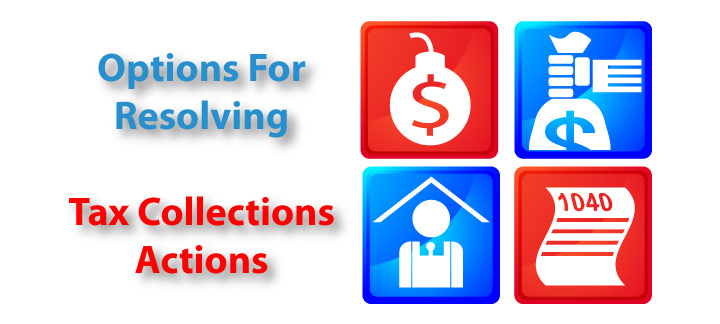What Are My Options for Resolving a Tax Collection Action with the IRS?
What the IRS has determined that a taxpayer owes a tax debt, they are entitled by the US government to begin tax collections actions. In those cases, the taxpayer has several options for resolving the Tax Collection Action with the IRS. First, the taxpayer may simply decide to pay the amount in full. When that is not a possibility, the taxpayer may attempt to settle the case with the IRS using several different avenues: Installment Agreement, Offer in Compromise, Currently Not Collectible, or a Collection Due Process Hearing.
What is an Installment Agreement?
An Installment Agreement is an arrangement between taxpayer and the IRS, whereby the taxpayer pays the tax debt in monthly payments. If you are able to negotiate an installment agreement, the IRS will not be allowed to continue to pursue levies of your bank accounts or wages, or seize and sell your property.
What is an Offer in Compromise?
An Offer in Compromise allows the taxpayer to resolve his or her tax debt by paying an amount less than the actual tax debt owed. This can be a very good option for taxpayers who cannot afford to pay their tax debt in full, or if doing so would cause financial hardship. In order to apply for an Offer in Compromise, the taxpayer must fill out certain IRS forms and provide financial information to the IRS. In considering a request for Offer in Compromise, the IRS uses a very specific formula that will consider income, expenses, ability to pay, and asset equity. The IRS will consider approving the request when it is clear that the taxpayer is offering to pay as much as the IRS could reasonably expect to collect from that taxpayer. Learn more about Offer in Compromise.
When is a Tax Debt Considered Currently Not Collectible?
The IRS may agree to classify a taxpayer’s tax debt as Currently Not Collectible when collecting the debt would cause a hardship for the taxpayer. Demonstrating that tax debt should be considered CNC is not an easy task and the IRS will require detailed financial disclosure. Along with official IRS forms, the taxpayer must submit documents substantiating the taxpayer’s income, expenses, and assets. Another important thing to know is that even if the IRS gives a tax debt CNC status, the case can be re-opened at a later date if the taxpayer’s circumstances change. Thus, CNC status is a temporary solution, but it will not cause the tax debt to be forgiven indefinitely.
How Can I Request a Collection Due Process Hearing?
A taxpayer can request a Collection Due Process hearing when he or she receives notice of a lien or levy. In order to exercise this right, the taxpayer must submit a written request in a specific period of time using a specific IRS form. These hearings take place in front of the IRS Office of Appeals, who will consider the taxpayer’s financial information and supporting documents. The purpose of the CDP hearing is to determine the best collection procedure for the taxpayer and the IRS.
A Tax Attorney Can Help You Resolve Your Tax Debt with the IRS
Negotiating an alternative tax resolution with the IRS can be complicated and requires the taxpayer to complete specific forms. In addition, nearly every application must be accompanied by detailed financial records demonstrating the taxpayer’s income, expenses, and assets. In most cases, the IRS will attempt to overstate the taxpayer’s income because that would result in a higher amount being paid to the IRS. An experienced tax attorney can help you complete all required forms and organize your supporting financial documentation. A tax attorney can also help you select the best option for resolving your tax debt. If you have received a notice of lien or levy, call today for a free consultation.
The Tax Lawyer - William D Hartsock has been successfully helping clients stop tax collections actions since the early 1980's. Mr. Hartsock offers free consultations with the full benefit and protections of attorney client privilege to help people clearly understand their situation and options based on the circumstances of their case. To schedule your free consultation simply fill out the contact form found on this page, or call (858)481-4844.



Comments (0)